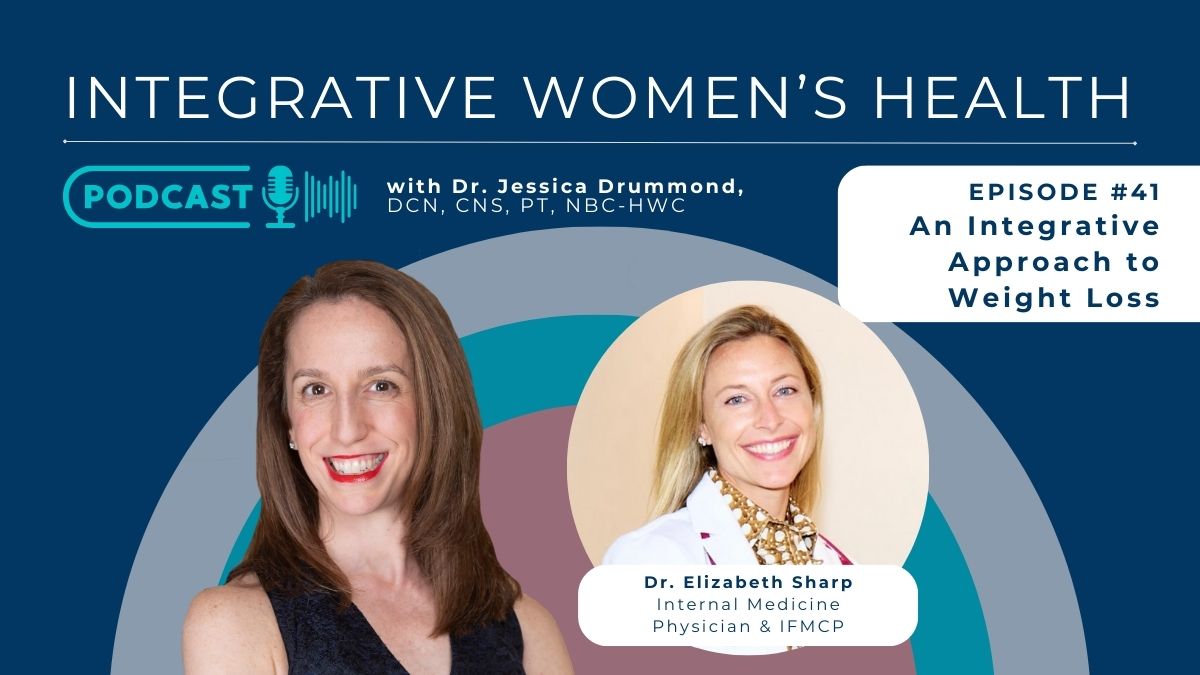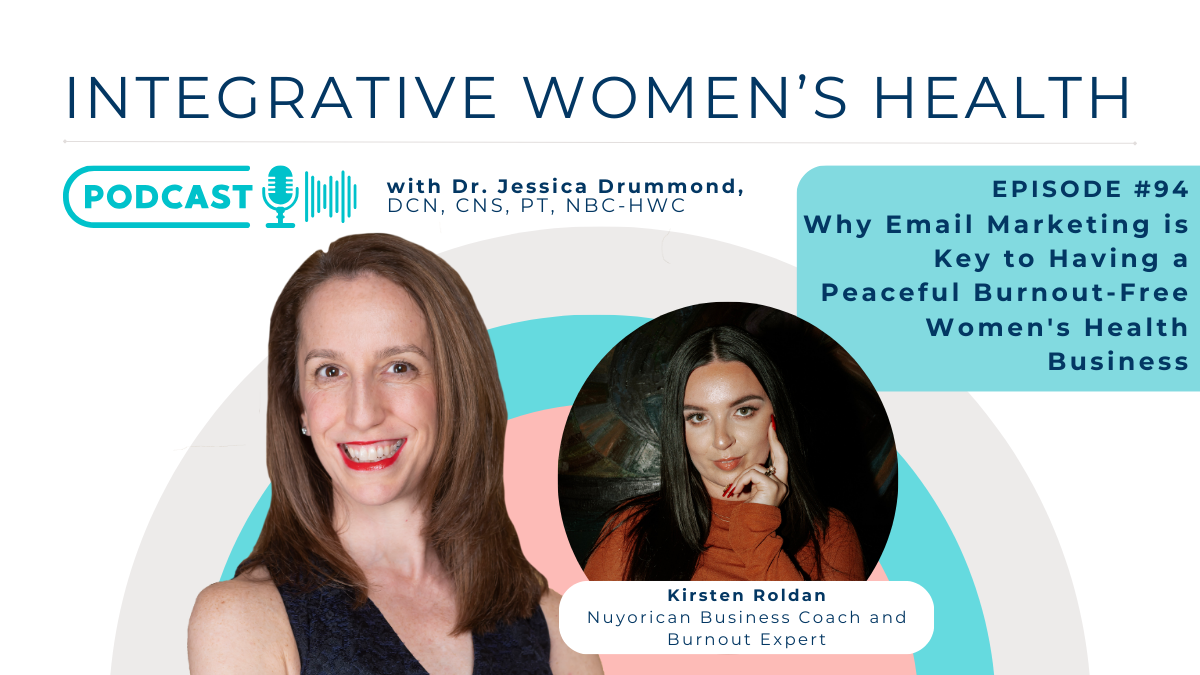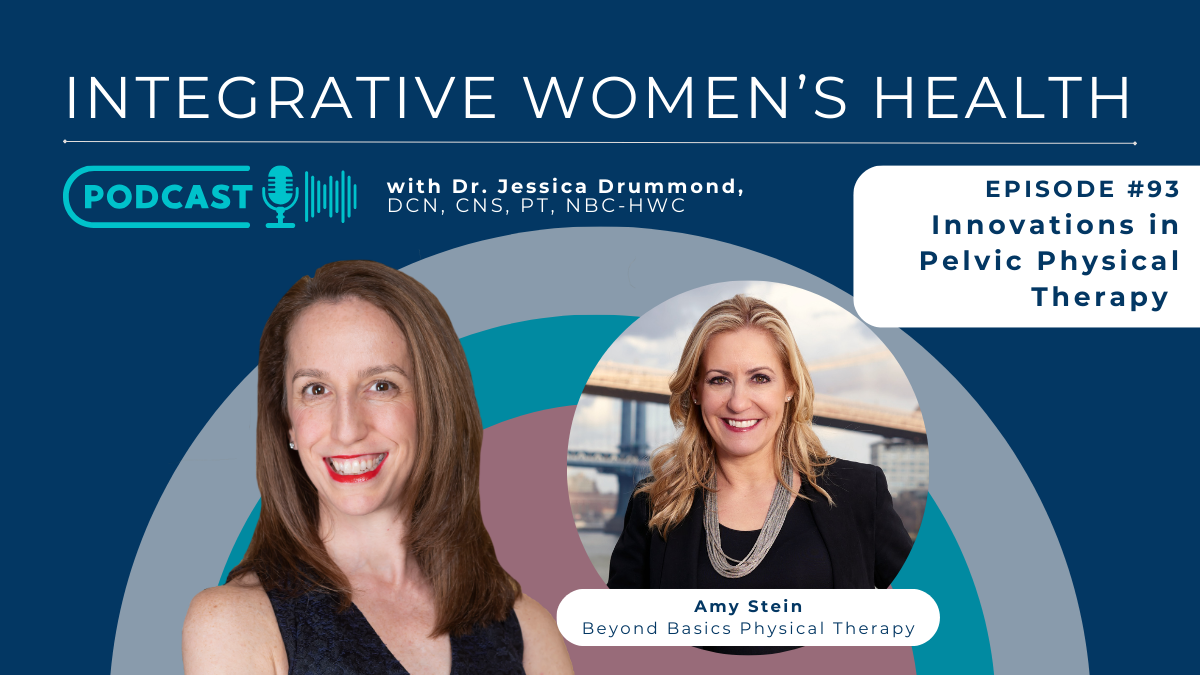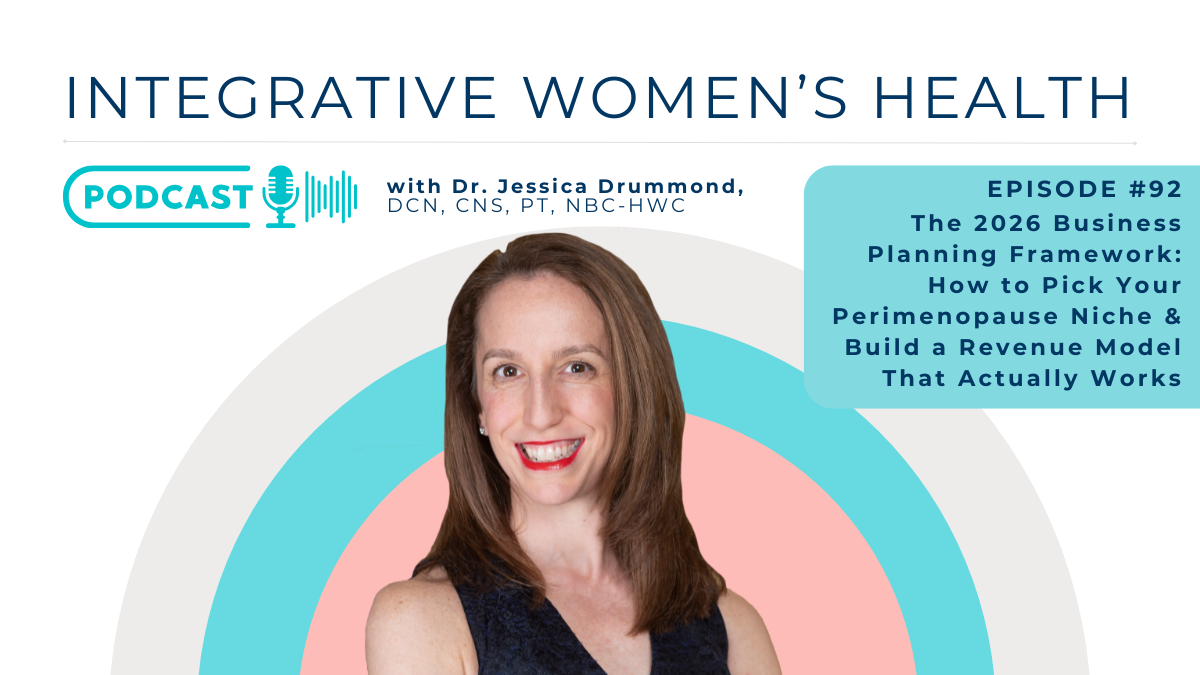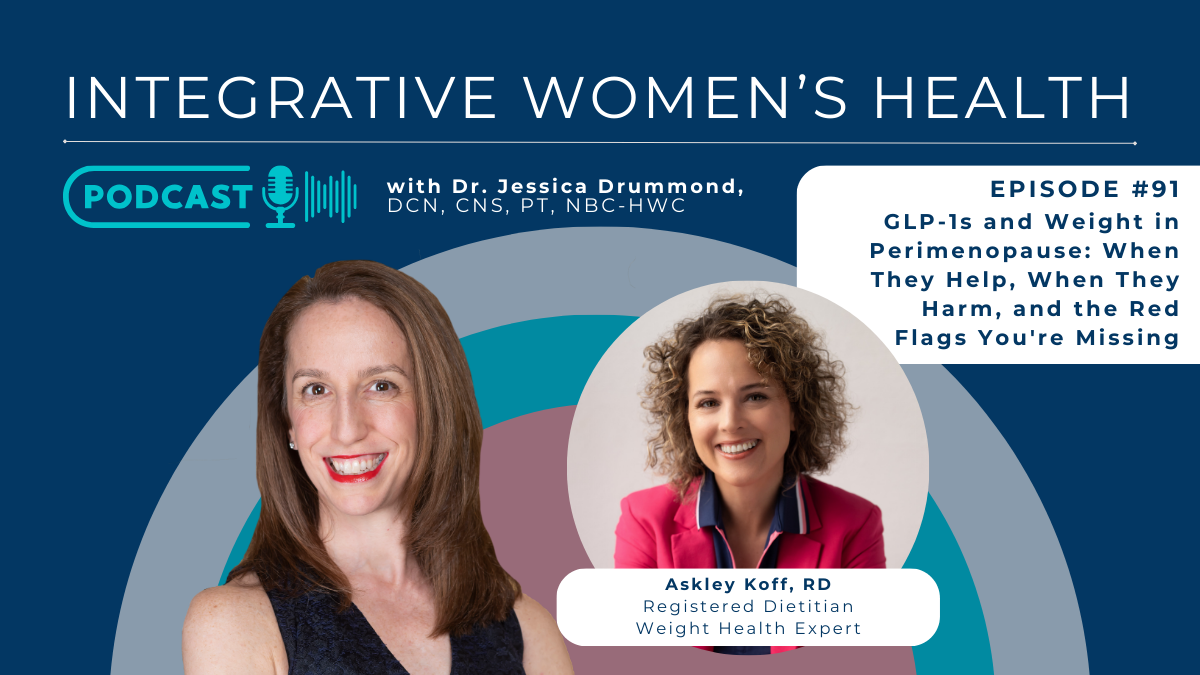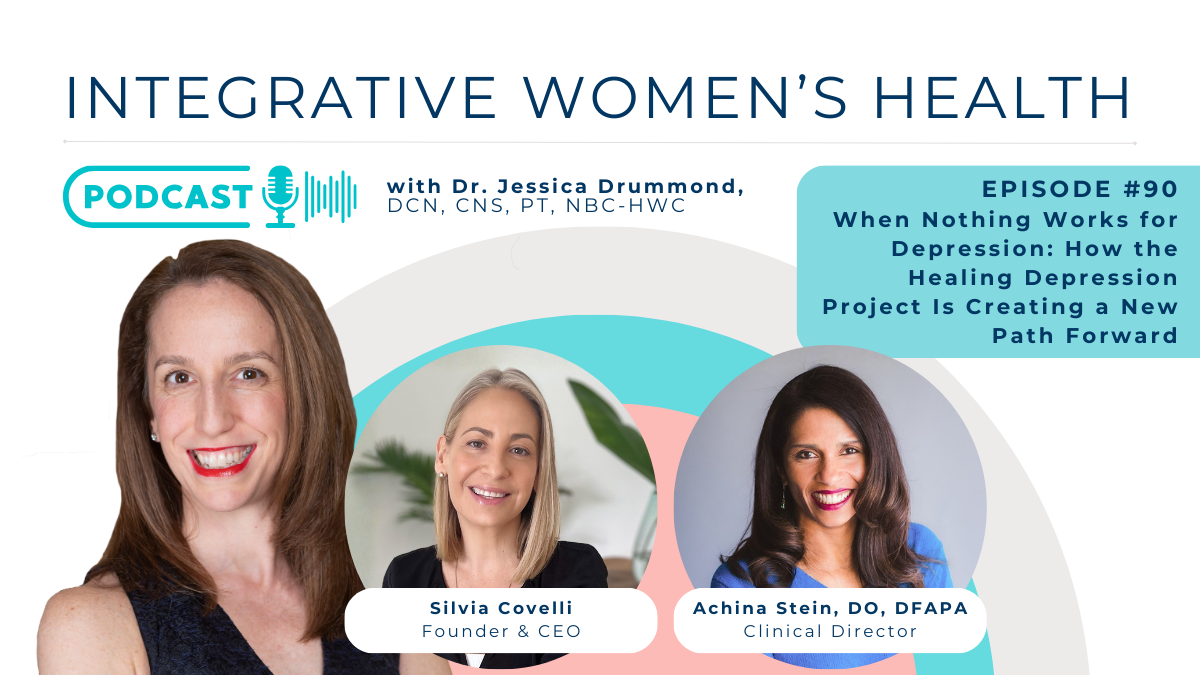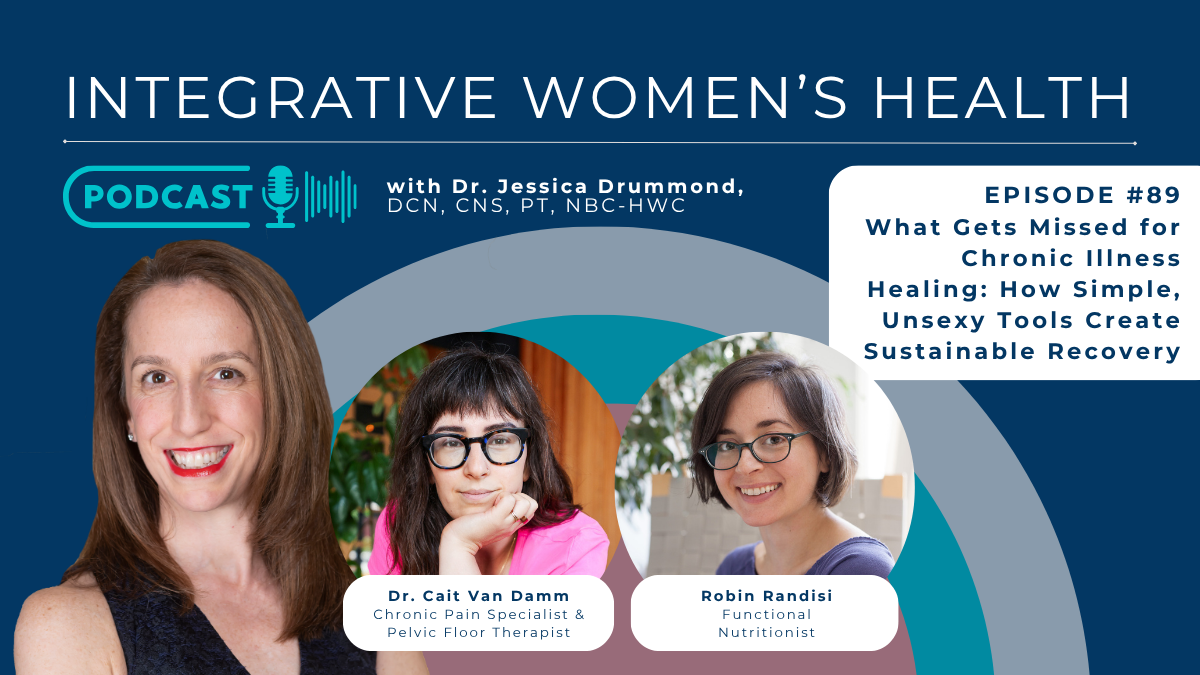Follow Us for Free:
About the episode
“I always pair the exercise and nutrition plan with the medication because the goal is to foster positive behavior changes to reinforce the changes occurring with the medication. That’s what maintains the weight loss.” – Dr. Elizabeth Sharp
Losing weight can be very challenging, and many people get stuck in a vicious cycle where they are making positive changes but not seeing their desired results. In these cases, when we understand how to integrate a healthy diet and exercise, having something like a GLP-1 agonist to help jump-start your hormone balance can be a game-changer.
Whether it’s pharmaceuticals or nutraceuticals, there is no one-size-fits-all solution, and GLP-1 agonists like Ozempic and Wegovy are no different. They can be highly beneficial when we view them as morally neutral tools, especially in collaboration with practitioners who can put them in context alongside exercise and nutrition.
Today, I’m so excited to introduce you to Dr. Elizabeth Sharp, an internal medicine doctor in New York City who recently started her private primary practice with an additional focus on weight management. Dr. Sharp has a preventative mindset that is rare in conventional medicine, and seeing her approach gives me hope that we’re turning a corner in the Western medical system.
In today’s episode, Dr. Sharp and I discuss the role of GLP-1 agonists in weight management, the importance of lifestyle changes, what an integrative approach to weight loss looks like, the need for preventative health measures, her approach to longevity, how you can reach your long-term health goals, and more.
Enjoy the episode, and let’s innovate and integrate together!
About Dr. Elizabeth Sharp
Elizabeth Sharp, M.D., IFMCP, is a board-certified Internal Medicine Physician, Institute for Functional Medicine Certified Practitioner and the founder and CEO of Health Meets Wellness. Sharp started Health Meets Wellness to make functional medicine more accessible, combining her expertise in healthcare with physical activity, specifically yoga. Elizabeth completed her 200-hour yoga teacher training and believes in combining daily movement practices with medicine to help treat her patients. She is dedicated to helping her patients reach their wellness goals and developed the Health Meet Wellness method with Troy Flanagan, Ph.D. and Susie Parker-Simmons, RDN, specifically to help patients with weight management.
In addition to her innovative practice, she is an Assistant Professor at Mount Sinai Hospital. She graduated medical school Magna Cum Laude from St. George’s University and completed her residency in Manhattan at Lenox Hill Hospital. After residency, she worked for Mount Sinai Doctor,s where she was awarded the Cullman Family Award for Excellence in Physician Communication and worked at OneMedical. Through her education and real-life experience, Sharp uncovered that taking a functional medicine approach helps diagnose and treat the root cause of her patient’s symptoms and disease processes. Her patient-centered style of practice combines diet and lifestyle with medicine to deliver multifaceted, holistic care for her patients. When she’s not seeing patients she enjoys cooking, hiking, rock climbing , running, yoga and spending time with her friends and family.
Highlights
- Dr. Sharp’s journey into functional and integrative medicine
- How Dr. Sharp combines conventional and functional medicine in her practice
- The types of weight loss patients Dr. Sharp works with
- Integrating GLP-1 agonists into a comprehensive weight management strategy
- Essential components of effective weight management
- Physiological challenges with losing weight and the need for support beyond willpower
- Unexpected benefits and potential drawbacks of GLP-1 agonists
- Dr. Sharps’ strategies for promoting health and longevity in her patients
- The importance of daily habits and preventive care in managing health and chronic diseases.
- Why Dr. Sharp advocates for data-driven patient care
- How small, consistent steps can help you reach your long-term health goals,
- Empowering your clients with knowledge and tools for their health
Connect with Dr. Elizabeth Sharp
- Dr. Elizabeth Sharp’s Practice
- Dr. Elizabeth Sharp on Instagram @Dr.ElizabethSharp
Ready to revolutionize your career and grow your practice?
- Schedule a call with our career coaching team: https://integrativewomenshealthinstitute.com/womens-health-coach-certification-program/
- Integrative Women’s Health Institute on Instagram | @integrativewomenshealth
- Integrative Women’s Health Institute on YouTube
Learn more about The Integrative Women’s Health Institute’s Programs.
Click here for a full transcript of the episode.
Dr. Jessica Drummond 00:00:03 Hi and welcome to the Integrative Women’s Health Podcast. I’m your host, Doctor Jessica Drummond, and I am so thrilled to have you here as we dive into today’s episode. As always, innovating and integrating in the world of women’s health. And just as a reminder, the content in this podcast episode is no substitute for medical advice, diagnosis, or treatment from your medical or licensed health care team. While myself and many of my guests are licensed healthcare professionals, we are not your licensed healthcare professionals, so you want to get advice on your unique circumstances. Diagnostic recommendations treatment recommendations from your home medical team. Enjoy the episode. Let’s innovate and integrate together. Hi there and welcome back to the Integrative Women’s Health Podcast. I’m your host, doctor Jessica Drummond, founder and CEO of the Integrative Women’s Health Institute. I am so excited to introduce you today to Doctor Elizabeth Sharp. She is an internal medicine doctor in New York City, and she recently started her own private practice. Looking from a primary care perspective and focusing specifically on weight loss, weight gain, weight loss resistance, body composition optimization, and longevity.
Dr. Jessica Drummond 00:01:34 She has this very preventative mindset that I think is so rare in much of conventional medicine’s practice. You know, the entire system is we’re all very well aware, is built on disease management, symptom management, not so much a longevity body composition, prevention of chronic illness, rolling back of chronic illness. And I love to see young internal medicine doctors taking this approach. It gives me so much hope that we’re actually turning the tide on the significant system that is the Western medical system. So meet Doctor Elizabeth Sharpe. I’m going to introduce you to her accolades here, and then we’ll get into our conversation. So Doctor Elizabeth Sharp is a board certified internal medicine physician. She has been trained and certified by the Institute for Functional Medicine, and she’s the founder and CEO of Health Meets Wellness. Doctor sharp started Health Meets Wellness to make functional medicine more accessible, combining her expertise in health care with physical activity, especially yoga and yoga. We’ll talk a lot about yoga and how we can integrate that, even for those of us who are super busy.
Dr. Jessica Drummond 00:02:54 In this episode, Elisabeth completed her 200 hour yoga teacher training and believes in combining daily movement practices with medicine to help treat her patients. She’s dedicated to helping her patients reach their wellness goals and develop the health meets wellness method. With Troy Flanigan and Susan Parker Simmons, R.N., she specifically helps patients, as I mentioned, with weight management, unraveling of chronic illness, prevention of chronic illness and longevity. Let’s get into our conversation. We’re going to talk a lot about GLP one agonist hottest topic in weight management. And I want you to jot down a few notes about why we do not want to just use GLP one agonist in isolation, how Doctor Sharpe and her practice, and how doctor Don Allen and I and our chronic illness and menopause practice. Think about GLP one as really important and valuable tools, but not to be utilized in a vacuum. So let’s get into the conversation and I’ll see you on the other side. All right. Hi, Doctor Sharp, thank you so much for joining us here on the Integrative Women’s Health Podcast.
Dr. Elizabeth Sharp 00:04:16 Thank you so much for having me.
Dr. Jessica Drummond 00:04:18 Most of us who come to thinking more of an integrative approach, functional nutrition, functional medicine approach come through some kind of personal or family or clients story. Is that true for you? I would.
Dr. Elizabeth Sharp 00:04:37 Say yes. I would say a couple of things. So definitely a personal interest and also, as you said, you know, client or patient interest. So, you know, I had a lot of patients initially when I was right out of residency that had a lot of GI symptoms that weren’t necessarily explained by the more traditional medicine workup. Even when I would refer to GI, they didn’t always have a solution for the symptoms or a clear etiology. And so that kind of opened the door to thinking like, is there more that we can be doing, or is there more that we can offer these patients? And then additionally, I would say that I suffer from IBS. So I had a personal interest and also figuring out what was going on. So those two things together really opened the door to functional medicine.
Dr. Elizabeth Sharp 00:05:23 And now I really enjoyed taking an integrative approach. And I think that it’s interesting because Covid has also kind of opened the door for people being more engaged with their health overall, and I think also more open to exploring more different styles in terms of different remedies and supplement options and things like that. And really, one of the things that I love the most about having more of a comprehensive knowledge, integrative and functional medicine is being able to give patients options.
Dr. Jessica Drummond 00:05:53 Yeah, that’s really true. I think it expands the toolbox, if you will. And so you work in internal medicine. Very generalized. Is your practice generalized or do you tend to focus in particular areas.
Dr. Elizabeth Sharp 00:06:09 Yeah. So I would say I do have a general internal medicine practice in terms of general primary care. But I also do weight loss. So I would say that’s a particular area of interest. And then I would say in terms of the integrative approach and integrative medicine, I would say that kind of lends itself to weight loss, because in my practice, I specifically blend medicine, exercise and nutrition for all of my patients.
Dr. Elizabeth Sharp 00:06:32 And so another way to put it would be like body composition optimization and health optimization, which is something that is, I would say, kind of more longevity focused. So one of the biggest things I try to focus on is not just symptom management or disease diagnosis, but more long term health management. So like how are you going to feel in ten years? How are you going to feel in 20 years? You know, that kind of.
Dr. Jessica Drummond 00:06:56 So what is the general age range of people in your practice.
Dr. Elizabeth Sharp 00:07:00 So 18 and older. And I would say the general age range is probably around. I would say 30 to 60.
Dr. Jessica Drummond 00:07:11 And so are these people coming to lose quite a bit of weight. Or do they have kind of the post-baby or perimenopausal or postmenopausal kind of metabolic shifts that are or inflammatory issues or that are triggering the weight gain or the weight loss resistance in general.
Dr. Elizabeth Sharp 00:07:35 Yeah, that’s a great question. I think it’s a combination. So there’s really two types of patients. Right. So one would be a type of patient that may have struggled with weight for their majority of or the entirety of their adult and maybe even some of their childhood life.
Dr. Elizabeth Sharp 00:07:50 And then there are patients that have had an inciting event that have caused weight gain. And there’s definitely different management strategy depending on what the etiology of the weight gain was.
Dr. Jessica Drummond 00:08:02 Yeah, that makes a lot of sense. So I would imagine being in the weight loss resistance space that you talk a lot about GLP one agonists with your clients. So from a functional and integrative perspective, of course we want to put these new tools or new ish tools. I suppose we could talk about GLP one agonists as being peptides that have been around for quite a while in the research, but generally we put these into context. So that’s not the only tool. So can you talk about how you might use GLP one agonists in a more comprehensive approach, and how you might use them? For someone who maybe has a lifetime of low levels of GLP one, you know, that first category of clients you were talking about in the same way that people might have low insulin and type one diabetes versus someone who has an inciting event.
Dr. Jessica Drummond 00:08:53 You know, we’re interesting, interestingly, seeing a ton of use of GLP one and improvements in GLP one agonist in people with endometriosis. So like other inflammatory conditions, you know, how do you use this in your practice in a more practical way without just prescriptions for GLP one agonists? Yeah. So I would.
Dr. Elizabeth Sharp 00:09:14 Say that’s kind of exactly what I do in my practice is I don’t just prescribe the medication, but I always have the exercise and nutrition plan that’s paired with the medication, because the goal is really to foster positive behavior changes to reinforce the changes that are occurring with the medication as well, because that’s what actually maintains the weight loss rate. So the goal would be to not have to be on the medication forever if you’re not a diabetic. Right. And so the goal would be to actually be able to have a metabolic reset, especially once you lose a significant amount of weight. You’ve reversed a lot of the hormone dysfunction. And then you have a new baseline or homeostasis. Right. And so that’s really what I focus on in my practice is that that positive behavior change what I like about the medication.
Dr. Elizabeth Sharp 00:09:58 And pairing it with diet and lifestyle changes is that you get a lot quicker of a response from the medication in terms of weight loss, so it actually forms a positive feedback loop with that behavior change that can be really challenging for patients specifically like the ones that you mentioned, maybe with PCOS or endometriosis, where they’re making a lot of changes. It’s challenging. It’s difficult. There’s a lot of compromise in terms of what they’re eating and their lifestyle, and they’re not getting the results that they want. Right. The medication helps them get those results much quicker, and then it reinforces those positive behavior changes that can really help to change the mind body connection, the gut brain axis, and improve not only physical health but also mental health.
Dr. Jessica Drummond 00:10:43 And so we see people really commit to the diet and lifestyle, and it does not move the needle for ten, 15 years. And then we layer on these new GLP one agonists and we see a change. So do we think physiologically for some people they actually need that additional medication.
Dr. Elizabeth Sharp 00:11:04 I think that they need an additional boost to help in terms of the hormone reset, because I think that what makes it so challenging to lose weight in a more traditional sense, for people who have a well-established homeostasis at a higher weight, is that the hormone balance and everything physiologically in your body is set to try to maintain a stable weight. So as you lose weight, everything in your body tries to get you to regain that weight, right. In terms of hunger cues, in terms of slowing down your basal metabolic rate and all of those things. And so there are a lot of things that you can do to counteract that in terms of, for example, one of the things I specifically do in my practice is we monitor not only body fat percentage, but lean muscle mass. As we know, muscle mass requires more calories than fat to maintain. So you can have a very similar basal metabolic rate at a much lower weight if you maintain your muscle mass versus what happens with a lot of people who kind of like yo yo diet and try to do these things without consuming enough protein, maybe without doing enough resistance training, is they actually end up with a higher body fat percentage at a lower weight, and then when they regain weight because they need less calories now to maintain this lower weight.
Dr. Elizabeth Sharp 00:12:17 And then once they kind of go off the diet protocol, then they or intervention, they are going to eat a little bit more and regain that weight. Then they end up at an even higher weight with a higher body fat percentage than they started. And so it can become a very vicious cycle and that can be really challenging. So I think having the tools to understand exactly how to go about healthy diet and exercise, and then also having something to help jumpstart that hormone balance, because everything is kind of, as I was saying, working against you to lose the weight can be really important for people who have, as I mentioned before, just that kind of well established homeostasis. And as we know, with obesity in particular as a disease, overall, the hormone balance is quite different than in a non obese individual. Right. So in terms of different hormones that are in your body that are actually promoting maintenance of the fat tissue. It’s actually in favor of maintaining that weight, and it can be really, really challenging to lose it.
Dr. Elizabeth Sharp 00:13:19 So I do agree, I think that the case could be made that some people really do need something like a GLP one medication or GLP one medication to help shift that balance.
Dr. Jessica Drummond 00:13:30 And one of the things I’m really interested in when it comes to these medications is the fact that we’re seeing such benefits in other symptoms. So, for example, people that are on a GLP one and get Covid, or 33% less likely to have a severe case, or people who have endometriosis go on the GLP one, then have without any weight loss, yet have less pain. What do you think about some of those benefits?
Dr. Elizabeth Sharp 00:14:01 I think it goes back to the hormone balance component. I think it really helps in terms of shifting that as well. As I would say, you know, the gut brain axis is very powerful, and I think that that’s something that can’t be overlooked in terms of the complexity of the neural pathways and the fact that GLP one medications do impact the pleasure reward system in the brain. They do impact the overall, I would say, like hunger cues and also your metabolism.
Dr. Elizabeth Sharp 00:14:30 Right. So all kinds of things are being impacted, not just I would say like fat burning or weight loss. Right. And so I think that that really plays a role in terms of some of these other symptoms in terms of, I would say also mood and energy levels. And then I think the other thing is there could be a lot of things that I would say could be similar to food noise, that could be similar to, let’s say, symptoms of chronic pain, where there are these chronic signals in the brain that our, you know, really fatiguing, overwhelming and challenging for people to deal with on a daily basis. And if you can just turn that volume down a little bit, I think it can really alleviate a lot of stress. And so there could be a component of that. I would say that’s just my own opinion. So, you know, take it for what it’s worth. But I would say definitely something with shifting that gut brain axis and the hormone balance for sure.
Dr. Jessica Drummond 00:15:25 Well, and certainly potentially like inflammation or even cellular autophagy, you know, other things that we find do similar things like fasting, you know, sometimes we’ll get similar results, but it’s harder to maintain long term. Same idea.
Dr. Elizabeth Sharp 00:15:42 and it does the same thing where like if you’ve been fasting for I don’t know if you’ve ever done intermittent fasting, but it certainly quiets the food noise after a bit. Right? Because you’re just like, it’s not part of the program. So you move on to thinking about other things. But yeah, I think you brought up a really good point too, with the inflammation. Undoubtedly, it definitely helps reduce inflammation. And I think again, it’s I think, you know, multifaceted or multifactorial in terms of with weight loss and reduction in adiposity, you definitely reduce inflammation. But I think that there are other pathways in terms of even insulin and some of the other ingredient hormones that are impacted by these medications that are greatly reducing inflammation, specifically, probably related to blood sugar levels as well.
Dr. Elizabeth Sharp 00:16:24 And also just those feedback loops with the neural pathways.
Dr. Jessica Drummond 00:16:28 Any major downsides you’re seeing patients?
Dr. Elizabeth Sharp 00:16:32 Well, I would say that if people aren’t taking them in, they’re not doing the recommended strength training. They’re not in, I would say increasing their protein intake with weight loss. They could lose lean muscle mass, which is something we talked about before that can, you know, make things more challenging, especially for maintaining the weight. In addition, there are some side effects and some people are more affected than others just with the GI side effects. So constipation would be the biggest one that I see. That’s largely treatable and manageable, especially if you get ahead of it. But I would say something definitely, you know, they can’t be overlooked and should definitely be discussed sometimes a little bit of nausea. And for the most part, I would say other symptoms like let’s say increase in reflux symptoms or even nausea are generally impacted by overeating on the medication because you eat so much less and or eating less healthy foods.
Dr. Elizabeth Sharp 00:17:27 So greasier foods in general, which typically would cause reflux symptoms anyways, have a higher propensity to do so on the medication.
Dr. Jessica Drummond 00:17:35 Are you seeing any tachycardia? Because I’m hearing about that a little bit with people in the long Covid community who are taking it for that, for the inflammation related to long Covid. Yeah, I’ve.
Dr. Elizabeth Sharp 00:17:46 Seen it a little bit, but I would say generally it’s something that is multifactorial also. So for example, maybe somebody who has hypothyroidism, they’re losing weight. We need to reduce their thyroid medication dose a little bit. And they’re more sensitive as a result of having lost the weight and being on the medication. I’ve seen it a little bit, but I would say in terms of the mild sense. So something where also people might be a little bit more reactive to activity, but nothing kind of that would be alarming. But I would say for sure noticeable in a few patients. And I think one of the other things that exacerbates that is while the medication decreases hunger cues, it also decreases thirst cues.
Dr. Elizabeth Sharp 00:18:27 So especially during the summer, making sure that people stay hydrated is really important on the medication.
Dr. Jessica Drummond 00:18:32 Yeah. And I think it may also be related to disorder that can be triggered by that kind of slightly slower gut motility since there’s so much disorder in that population.
Dr. Elizabeth Sharp 00:18:44 Yeah. For sure. It’s definitely one of the known side effects of the medication.
Dr. Jessica Drummond 00:18:50 So it’s just a matter of how severe it is for whether or not a person can tolerate it or, you know, it’s okay to kind of navigate it, change the dose, things like that. Well, I would say.
Dr. Elizabeth Sharp 00:19:00 Also it’s a very small percentage of the population. I think when you take a look at the long Covid population, they also already have an increased risk of having, I would say dysautonomia and elevated heart rate. So you’re looking at it probably particularly reactive subset of the population generally I think I would say tachycardia reported like less than 10% of patients. So you know, a low percentage of the time. And again I would say yes, I guess it you know, it depends on the severity, but not something I’ve seen a lot of but definitely have seen in practice the biggest things I was there, the GI side effects.
Dr. Jessica Drummond 00:19:37 So let’s talk about longevity. It sounds like you have a subpopulation of clients who come and they’re relatively healthy, but they’re thinking for more of a prevention mindset. What are some of your approaches to that.
Dr. Elizabeth Sharp 00:19:56 To longevity or to preventative care with a longevity focus? I’m not sure I entirely understand the question. I’m sorry.
Dr. Jessica Drummond 00:20:04 Yeah. Just, you know, when you have a client who’s coming in and they’re, say, early 50s, who wants to think about longevity for the next 20, 30 years, what’s your kind of approach for that?
Dr. Elizabeth Sharp 00:20:18 Oh, okay. So what kinds of things do I focus on in terms of helping people optimize their health and longevity? I would say it depends. So a couple of different things. Overarching principles are definitely independence and functionality. In terms of as you age, the more dependent you can remain. Generally happier people are and longer they live, specifically, the longer their health span. So, you know, healthspan versus lifespan, right? Healthspan really highlights the ability to remain, having a high quality of life and being functional while you age.
Dr. Elizabeth Sharp 00:20:53 And so that’s really, I would say, where I focus more than just on, on lifespan. So with longevity, I think about and focus on what each patient or person likes to do right and what they would like their life to look like as they age, because everybody’s level of activity or desires are different. And so making sure that we set them up for success in that way. So for some patients, they’re already very motivated. In terms of exercise, we may focus more on the mental and spiritual component of things, allowing more time for themselves in their life and more time for friends and community connections with other patients. That might be really optimizing body composition. One of the other things I always focus on is prevention of chronic diseases. That’s one of the biggest things you can focus on, especially as a primary care doctor. I mean, the low hanging fruit is blood sugar, blood pressure, cancer screening, you know, all that kind of stuff. But then once you’ve crossed that kind of stuff off the list, then it’s focusing on really things that you do every day that actually impact your health in the long run.
Dr. Elizabeth Sharp 00:21:56 So people don’t think about those little habits that they have where I always recommend, like adding ten minutes of walking in a day, right? If you do that by the end of the week, you’ve definitely walked at least another mile, right? Then at the end of the month, you’ve walked another 30 miles, right? That’s a lot. So it’s those little things that I try to focus on. Maybe it’s, you know, cutting back a little bit on things that, you know, increase cholesterol or things like that, and then you really do actually move the needle in the long run. So that’s where I’d say I really try to focus. The other thing is I try to be data driven with patients so that we can track their success. So I’m really big on short term and long term goals because I think it fosters that positive feedback loop that we were talking about. Even with the GLP one medications, where I want patients to feel empowered with their health so that they feel like they have the tools to really maintain their health for the long run.
Dr. Jessica Drummond 00:22:49 I love that. And so as we wrap up, I would love to talk about your schedule like you’re a busy, working professional woman. How do you take care of your own longevity?
Dr. Elizabeth Sharp 00:23:03 Yeah. So well, I do walk a lot, so I do listen to my own advice, and I’ve definitely increased that a lot more recently. So I try as much as I can to get that 10,000 steps a day goal. And then one of the other things I would say is I do try to make sure that I take some time for, I would say, kind of unplugging and sometimes for just relaxing with daily movement. I love yoga, so I try to do that a good amount. And then one of the things that I’m focusing on for my longevity and I like to do this anyways, so it’s something I’ve been kind of continuing to work on is cooking, because cooking is, I think, one of the best things you can do for your health in terms of, you know, using food as medicine.
Dr. Elizabeth Sharp 00:23:44 So those are some of my passions and things that I try to focus on, besides also getting outside as much as possible, because I think it’s just so good for your nervous system.
Dr. Jessica Drummond 00:23:54 Yeah, absolutely. Agree with that. Anything else you want to share with our community? For people who are just needing a little bit of inspiration to start thinking about their next 20, 30 years, not just today.
Dr. Elizabeth Sharp 00:24:11 Yeah. You know, I would say I would liken it to standing at the base of a mountain and thinking about how you’re going to get to the top. If you just look at the top of the mountain, it’s going to seem like it’s so far away, and maybe it’s impossible, But really, if you start small, just making those small, consistent steps every day, before you know it, you’ll be at the top.
Dr. Jessica Drummond 00:24:30 Love that. Excellent. Well, thank you so much for being here with us today, Doctor Sharpe. And where can people find you if they want to learn more about your work and your practice?
Dr. Elizabeth Sharp 00:24:40 Yeah.
Dr. Elizabeth Sharp 00:24:41 So I can be found on Instagram, doctor Elizabeth Sharpe or Health Meets Wellness. Those are the two Instagram handles. Also our website. So health meets wellness.com. You can learn more about the practice and then otherwise you could email the practice at info at Health Needs wellness.com. Or you can call the number (917) 833-5234.
Dr. Jessica Drummond 00:25:05 And you see patients in person in New York City. Correct?
Dr. Elizabeth Sharp 00:25:09 Yeah. So I see patients in person in New York City Monday through Friday, 9 to 5. And then I also do telehealth, and I’m licensed in New York, new Jersey, Wisconsin, Wyoming. Florida. So many states.
Dr. Jessica Drummond 00:25:23 Excellent, excellent. That’s a really valuable. Well, thank you so much for being here with us today. And thank you for your very inspiring practice. I think the more that physicians think preventatively and integrative Li, the more opportunity we have to kind of dig out of this hole of chronic illness.
Dr. Elizabeth Sharp 00:25:41 Yes. Thank you so much for having me. I really appreciate it.
Dr. Jessica Drummond 00:25:45 Thank you. I so enjoyed that conversation with Doctor Elizabeth Sharp.
Dr. Jessica Drummond 00:25:58 What I think we’re learning more and more about GLP one agonist is just like so many tools in both conventional and integrative medicine, pharmaceuticals, nutraceuticals. They are not a one size fits all tool. They are morally neutral. They are of high benefit to certain people. The dosing is important, and the collaboration and refinement of utilizing these tools in context. And Doctor Elizabeth, Doctor Sharp really focuses on putting GLP one medications in context around exercise movement nutrition. Adding just ten minutes of walking a day gets you 30 more miles right, 30 more miles a month. And it’s those little things. But I think we have to be really if we’re truly going to be integrative. We don’t want to think about any pharmaceuticals or any nutraceuticals as either saviors or devils. They’re morally neutral, Role, valuable tools. It’s how we use them and how we collaborate with our clients when using them, how we empower and center our clients so that they understand them, know how to self-monitor for symptoms and side effects and benefits, and that can help us help our clients achieve their goals with all of the possible tools and support that we have.
Dr. Jessica Drummond 00:27:42 So I hope Doctor Elizabeth Sharp inspired you just a bit. So if you’re feeling like, oh, I am stuck in a rut, I need to start focusing on myself on my longer term health goals. Know that there are people here that can support you. I can support you. Doctor Elizabeth Sharpe can support you. Doctor Don Allen on my team can support you. You can support yourself. There are thousands now of really skillful, patient centric, client centric health and wellness professionals available to help you go from where you are. If you feel like you’re at the bottom of that mountain, and even if you’re a health professional yourself honestly, especially if you are a health professional yourself. Those of us in these caring professions need just as much support as anyone else to get to the top of our next mountain. What does that look like for you? What is your next vision? What is your next set of goals? Find and build the team that will center you and support you to get there. With all the tools necessary, they won’t hold back.
Dr. Jessica Drummond 00:28:56 We’re here to support you. Get to the top of that mountain, whatever your mountain looks like. And maybe your mountain is not a mountain at all. Maybe it’s floating in a stream. Maybe it’s some other kind of adventure. We’re here to support you. There are people who think this way with a deep knowledge of biochemistry and physiology, who want to support you to use all the tools available. I’ll see you next week. Take care. Thank you so much for joining me today for this episode of the Integrative Women’s Health Podcast. Please share this episode with a colleague and if you loved it, hit that subscribe or follow button on your favorite podcast streaming service so that we can do even more to make this podcast better for you and your clients. Let’s innovate and integrate in the world of women’s health.
Join Dr. Jessica Drummond to learn the three key steps to becoming a successful, board-certified Women’s Health Coach who leaves a lasting positive impact on their clients.
Learn how utilizing health coaching skills in your practice is crucial to your success, leaving a lasting impact on your clients, and shifting the paradigm of women’s healthcare.

Dr. Jessica Drummond
Founder & CEO
The Integrative Women’s Health Institute
At the Integrative Women’s Health Institute, we’ve dedicated 17 years to crafting evidence-driven, cutting-edge programs that empower practitioners like you to address the complexities of women’s health.
Dr. Jessica Drummond’s unique approach focuses on functional nutrition, lifestyle medicine, movement therapies, nervous system dysregulation, trauma, and mindset – essential elements often overlooked in traditional health education.
In addition, your training will be fully evidence based, personalized, and nuanced (this is not a cookie cutter approach) in functional nutrition, exercise, recovery, cellular health, and all other lifestyle medicine tools.
You’ll learn to support your clients with cutting edge tools safely and effectively.

